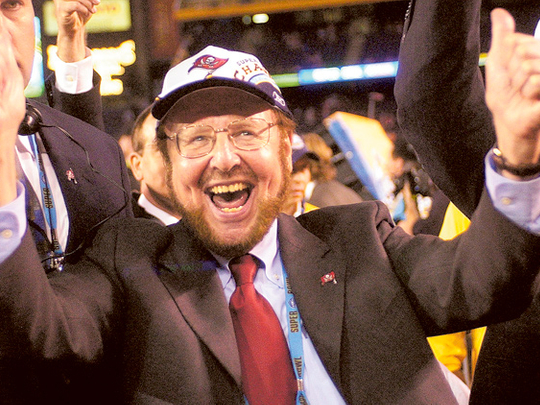
London: When the US businessman Malcolm Glazer took over Manchester United football club in 2005, concerns focused on the differences between Glazer and other foreigners who had bought into the British game. Unlike most, he was not a fan looking to indulge his ego with massive spending on a personal fantasy team. Instead, Glazer, who has died aged 85, approached the Premier League club in the same way he had most of his investments, identifying good value, and using a strategy designed to maximise his return, whether his takeover were successful or not.
Glazer’s fortune was built on a lifetime of such investments. The son of Lithuanian immigrants, he was born in Rochester, New York state, where his father ran a watch-parts business. The fifth of seven children, Malcolm was 15 when his father died, and sold watches door-to-door to help support his family.
By the time he was 21 he had a profitable franchise repairing watches at a military base, and began investing in trailer parks and nursing homes. Glazer created a holding company, First Allied Corporation, to diversify further, and became adept at using takeover strategies to enrich his business.
In 1984, First Allied made an unsuccessful $7.6 billion (Dh27.9 billion) offer for the then-bankrupt railway company Conrail, which included only $100m of its own cash. The purchase would be financed from Conrail’s future profits, which, after government deregulation, turned out to be substantial. Attempts to take over Formica in 1988 and Harley-Davidson and 1989 also failed, but in each case, the value of the stocks increased, and Glazer made substantial profits.
In 1994 Glazer and his son Avram took control of Zapata, an oil company set up in 1954 by the future US president George H.W. Bush and sold by him in the mid-60s. Then they got out of the oil business, buying supermarkets in the Caribbean, and later concentrating on a fishery subsidiary called Omega Protein. In 1998, Zapata set up Zap.com, which made a takeover bid for the internet portal Excite; again, the bid failed, but the Glazers profited from the rise in the price of stock they held.
Moving into the world of American sport, Glazer exhibited the same strategies. He bought the National Football League’s Tampa Bay Buccaneers in 1995, paying a then-record sum of $192m, despite the Bucs being a dismal team. To help finance the purchase, First Allied attempted to sell the Houlihan’s restaurant chain, which it controlled, to Zapata, which it owned outright. Moving Houlihan’s at a bargain price from one company they controlled to another would have netted First Allied nearly $60m in profit. But after an uproar, shareholders in Houlihan’s turned the sale down.
By threatening to relocate the Bucs, Glazer got the city of Tampa to fund the building of a new football stadium, and give the team a lease which featured low rent and virtually all ancillary income from the facility. On the field, a new coach, Tony Dungy, led the team to the NFL playoffs by 1997. Dungy failed to get them all the way to the Super Bowl final, so at the start of 2002 the Bucs fired him.
The Glazers eventually hired Jon Gruden, who was then under contract to the Oakland Raiders. They had to compensate Oakland, but it was worth it, as Gruden immediately took the Bucs to the Super Bowl final of the 2002 season, held in January 2003 — against Oakland. The Californian team’s signals indicating attacking moves had not been changed with the change of coach, so Gruden and the Bucs’ defence often knew exactly what Oakland were about to do before they did it. The Bucs crushed the Raiders to win their first Superbowl.
Later in 2003, the Glazers began buying shares in Manchester United, seeing an undervalued and underexploited international brand in an industry which is relatively recession-proof. Again, their takeover strategy was aimed at minimising their own exposure and on raising the value of their own investment in the club, to ensure profit even if the takeover failed.
As they began buying United shares, Zapata and Omega attracted attention as their share prices rose on the strength of rumoured takeover bids, which critics claimed were orchestrated by the Glazers to raise more cash. Eventually, the Glazers took over United at a cost of about £800m, but acquiring almost £575m of debt.
Glazer suffered a series of strokes in 2006, and was not often seen in public thereafter; the club was overseen by his sons Joel, Bryan and Avram. The sale in 2012 of 10 per cent of the shares in New York led to the whole being valued at around £1.5bn. In 2010, Forbes estimated Glazer’s net worth, derived from a wide range of business interests, at $2.4bn.
He is survived by his wife Linda, five sons (the other two being Edward and Kevin), and a daughter, Darcie, all of whom are involved in the family’s companies.












